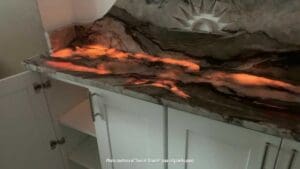Photo taken from the stock photo site Pexels
Introduction
Our regular reader, Fred, recently asked: Which is better for kitchen countertops—artificial granite or artificial marble?
This is an important question, as more homeowners are opting for artificial materials over natural stone. They offer a more affordable option, are easier to maintain, and still provide the durability and aesthetic appeal of real stone.
However, despite their similar appearance to natural stone, artificial materials have distinct characteristics that are essential to consider.
Today, we’ll provide a detailed answer to help both you and Fred choose the best stone for a countertop that will last for years. We’ve carefully analyzed all the key factors influencing the decision, including cost, availability, durability, and ease of maintenance.
1. What is artificial granite and artificial marble?
Artificial granite and artificial marble are engineered materials that replicate the look of natural stone but contain synthetic components. They are made using a mix of resins and stone particles, offering a cost-effective, durable, and versatile alternative to natural stone. With an extensive range of colors and textures, the choices are endless!
Artificial granite is typically composed of quartz, resin, and other minerals, resulting in a material that is strong, resistant to stains and damage, and available in a variety of finishes to suit any design preference.
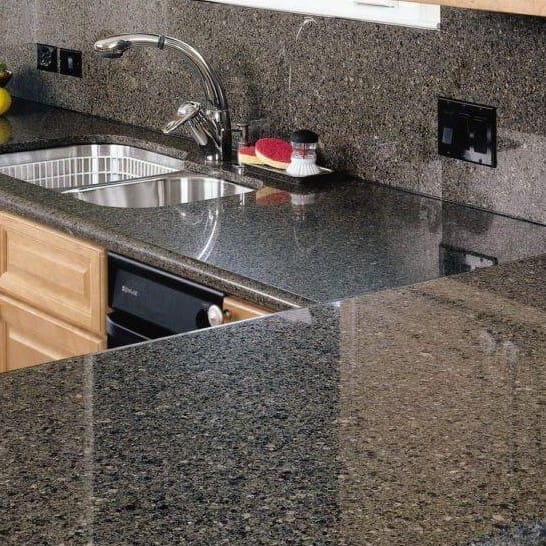 Photo taken from Pinterest (@techkomplect)
Photo taken from Pinterest (@techkomplect)
Artificial marble, on the other hand, is made from a blend of stone particles and resins, giving it a smoother surface and making it easier to clean than natural marble. It also offers the added benefit of being resistant to stains and damage, making it a practical and stylish choice for modern interiors.
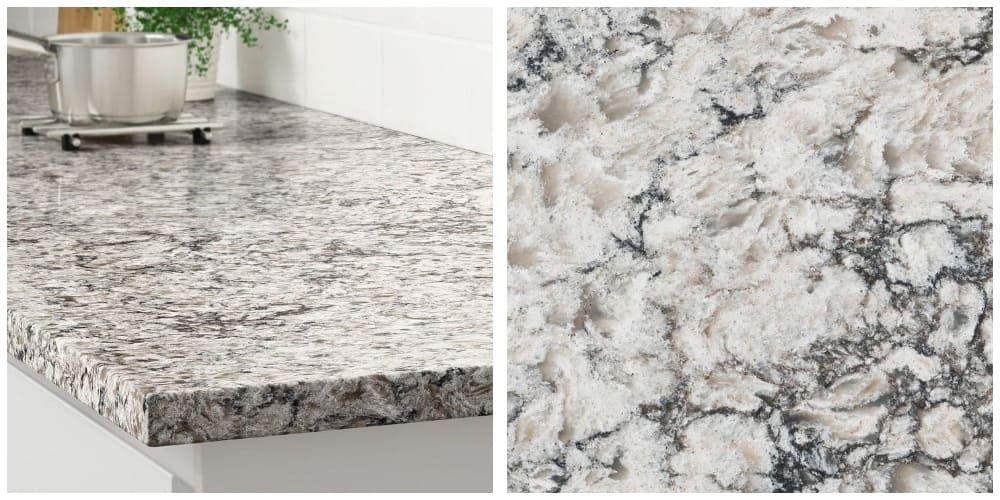 Photo taken from (@IKEAUSA)
Photo taken from (@IKEAUSA)
2. Advantages and disadvantages of artificial granite and marble
Artificial granite and marble are gaining popularity for their numerous advantages. These materials provide the beauty of natural stone while offering enhanced durability and performance.
1. Cost-effectiveness
According to StoneContact — a leading B2B online marketplace for the stone industry — artificial granite and marble offer a more affordable alternative to natural stone while still providing high durability and an attractive appearance.
As The First National Ranking of Stone Countertop Fabricators and Installers in the U.S., we continuously analyze countertop pricing across various states and cities. The cost of granite and marble countertops in the U.S. varies based on material quality, installation complexity, and regional factors.
Based on our data, we can confirm that, on average, natural stone prices are:
- Granite countertops: $60 to $150 per square foot, including installation.
- Marble countertops: $50 to $250 per square foot, including installation.
Artificial granite and marble: Typically range from $40 to $100 per square foot, offering a more budget-friendly alternative to natural stone.
Keep in mind, however, that prices can vary by region, quality of material, and complexity of installation. We only give average prices based on our research, in which we as a mystery shopper find out the prices for our kitchen countertop project in different states in the United States. If you are interested in reading, you can find all the articles here.
2. Longevity and Wear Resistance
Artificial granite and marble are not only durable, but also resistant to fading, unlike natural stone, which can change color when exposed to sunlight. According to HomeAdvisor, a top online platform that connects homeowners with home improvement experts, faux stone maintains its look for years, making it a durable and easy-to-maintain option for kitchen surfaces.
3. Care and maintenance
Artificial stone requires minimal upkeep compared to natural marble and granite, which are prone to staining and require regular polishing. In contrast, artificial stone maintains its smooth, clean surface with little effort.
This is also supported by Surrey Marble and Granite—a blog by a UK-based stone contracting company—which highlights that artificial marble and granite demand significantly less maintenance than natural stone and are easier to clean.
4. Unlimited Design Options
Artificial stone offers endless design possibilities, as it can be manufactured in a wide range of colors and textures. If you're looking for a specific shade or a unique pattern, artificial stone is the ideal choice. Unlike natural stone, which comes with inherent variations, artificial materials allow you to achieve your desired look with precision and consistency.
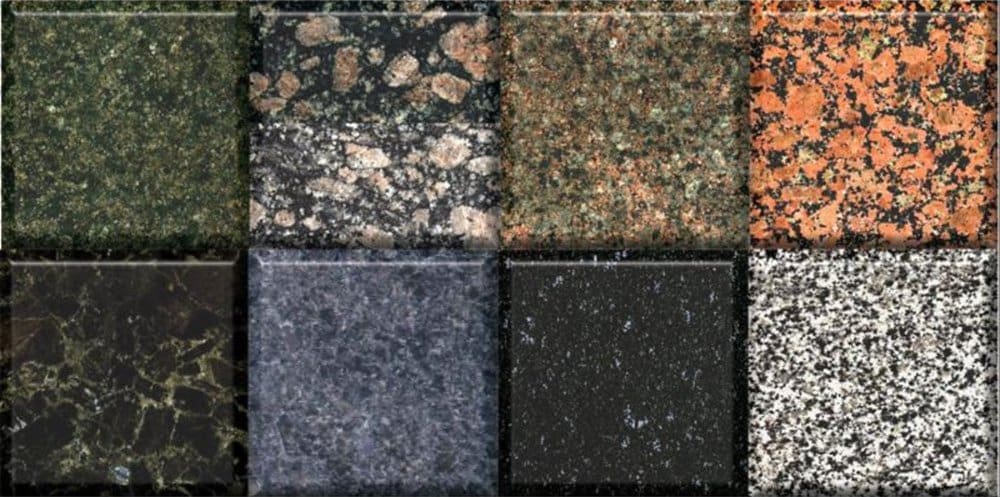 Example of colors of artificial granite. And that's not all! Photo taken from Pinterest (@tarmogin80)
Example of colors of artificial granite. And that's not all! Photo taken from Pinterest (@tarmogin80)
Disadvantages of artificial granite and marble
While artificial granite and marble come with many benefits, they also have certain drawbacks to consider when selecting a countertop material. Let’s take a closer look at these potential disadvantages.
1. Temperature Sensitivity. Although artificial stone is durable, it is less heat-resistant than natural granite. Placing a hot pot or pan directly on the surface can cause damage over time. According to Surrey Marble and Granite, exposure to excessive heat may even lead to cracking in artificial stone.
2.Manufactured Look. For some people, it is important for the material to be natural and unique. Artificial stones, although they can imitate natural granite or marble, are sometimes perceived as less natural and more "manufactured". However, for those who value practicality, this is not a disadvantage at all.
3. How to Identify Artificial vs. Natural Stone?
It’s quite simple—anyone who has compared samples of natural and artificial granite or marble even once will develop an eye for the difference. However, there’s an even easier method—the water test. Let’s break it down step by step!
1. Texture and patterns
Natural stone is always one of a kind, with patterns formed by natural processes, creating a distinct texture with mineral inclusions and fragments of other stones. Artificial stone, on the other hand, has a more uniform and consistent appearance, as it is produced using resins and mineral components for a controlled, predictable texture.
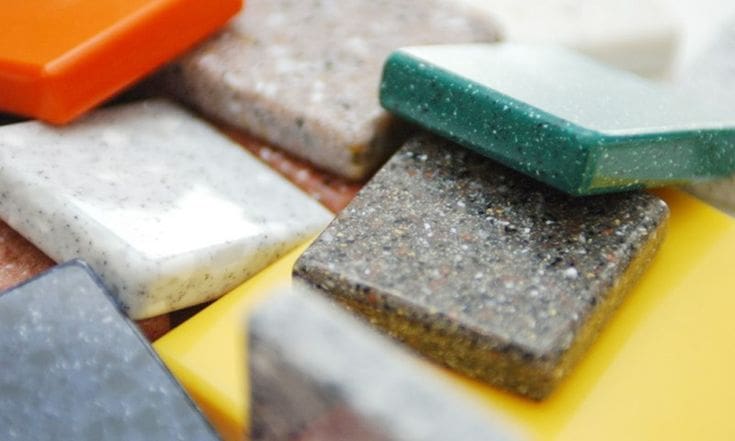 Photo taken from Pinterest (@kaxabery)
Photo taken from Pinterest (@kaxabery)
2. Porosity test
Natural stones, like granite and marble, have a porous structure, making them more prone to moisture absorption. To determine whether a stone is natural or artificial, simply place a few drops of water on the surface. If the water is absorbed, the stone is likely natural. Artificial materials, on the other hand, have a denser composition and do not absorb liquids, keeping the surface resistant to moisture.
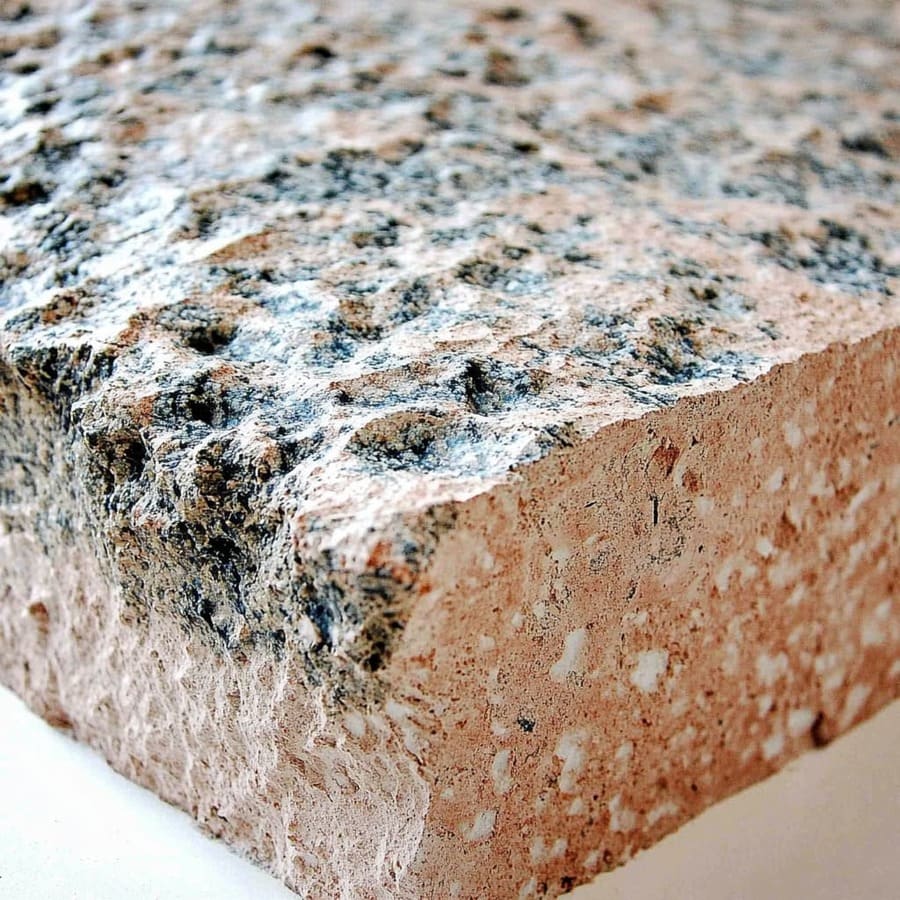 Example of Granite Countertop Porosity – AI-Generated Image.
Example of Granite Countertop Porosity – AI-Generated Image.
4. Choosing stone for countertops: artificial or natural stone
When choosing a material for your countertop, it is important to consider several factors:
- Budget: If you're working with a limited budget, artificial stone is an excellent alternative to natural granite or marble, offering a similar look at a lower cost..
- Maintenance & Durability: If ease of maintenance and long-term durability are priorities, artificial stone provides a low-maintenance, resilient option.
- Design. If you need to match the material to a specific interior, artificial stones offer more options for creating a unique design.
5. What do homeowners like best?
When selecting a kitchen countertop, it's essential to consider not just the technical features, but also the experiences of homeowners who have already installed these materials. To help you make a well-informed decision, we've gathered real reviews from open sources that highlight the pros and cons of each option.
“It has been two years since the installation of the artificial granite in the kitchen. I am very satisfied with my choice! The surface is completely non-scratchable, which was a very important factor for me as we often cook and use various knives in the kitchen. Stains are also not absorbed, which makes it easy to clean. When I was choosing the material, it was important to me that the worktop was resistant to water and grease, and the artificial granite fully met my expectations. Despite use, it looks like new, and that's a big plus. The only point is that you have to be careful with hot objects to avoid damaging the surface.”
“We now have artificial marble in our kitchen and it really is a great choice. We were looking for a material that would not only be beautiful but also easy to use. The surface is smooth, which makes it easy to keep clean. Coffee, wine and oil stains are not absorbed and I don't have to worry about stains. The marble has a gorgeous appearance and the kitchen now looks much more luxurious. We are very pleased that we chose artificial marble as it retains
Reviews from homeowners confirm that man-made granite and marble countertops are a great choice for kitchens. They provide durability, resistance to damage, and ease of maintenance. Many users note that such countertops retain their appearance for many years, making them a worthwhile investment in the kitchen interior.
6. Care and installation tips
Artificial stone is not only visually appealing but also a highly practical material that requires minimal maintenance, making it an ideal option for kitchen countertops. However, to preserve its beauty and durability over the years, it's essential to follow a few simple care guidelines.
- Method All-Purpose Cleaner. This environmentally friendly product removes dirt well and is suitable for different surfaces, including artificial stone.
- Seventh Generation Dish Liquid. Another natural cleaner that effectively cleans stone surfaces without leaving residue or causing damage to the material.
Unlike natural stone, artificial stone is less porous, making it easier to maintain and less prone to absorbing stains. For regular cleaning, simply use a soft cloth or sponge. For tougher stains, a water and vinegar solution or a specialized stone cleaner can effectively restore the surface without causing damage.
- Bar Keeper's Friend. This product effectively removes tough stains from artificial stone without damaging the surface.
- Weiman Granite & Stone Cleaner. This product is specially formulated for deep cleaning of artificial stone surfaces, effectively removing stains without damaging the material.
While artificial stone is resistant to most household liquids, it is not heatproof. Prolonged exposure to hot objects, such as pots and pans, can lead to surface damage. To prevent this, we recommend using coasters and heat-resistant stands.
Additionally, for optimal durability and a flawless finish, it’s best to entrust the installation of artificial stone countertops to experienced professionals.
Conclusion
Artificial granite and marble are excellent options for those seeking a balance of beauty, durability, and affordability. If cost-effectiveness, low maintenance, and diverse design choices are your priorities, artificial stone countertops can be an ideal solution.
However, it's important to consider potential drawbacks, such as heat sensitivity and susceptibility to sun exposure. For the best selection and professional installation, trust the qualified contractors from The First National Ranking of Stone Countertop Fabricators and Installers in the U.S. to help you find the perfect countertop for your home.




 Photo taken from (@IKEAUSA)
Photo taken from (@IKEAUSA) Example of colors of artificial granite. And that's not all! Photo taken from Pinterest (@tarmogin80)
Example of colors of artificial granite. And that's not all! Photo taken from Pinterest (@tarmogin80) Photo taken from Pinterest (@kaxabery)
Photo taken from Pinterest (@kaxabery) Example of Granite Countertop Porosity – AI-Generated Image.
Example of Granite Countertop Porosity – AI-Generated Image. 


